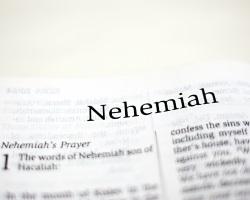When God established His relationship with Israel in the Book of Exodus (and reiterated it in Deuteronomy), He cut a deal—a gracious deal. The deal was, if Israel abided by and obeyed God’s commands, they would be His people and remain in the land God had given them. However, if they disobeyed, God would allow them to be decimated and removed from the land. This is the gracious part: If removal and decimation happened, God still gave them an opportunity to pick up the pieces and restore their relationship with Him.
The Old Testament Book of Nehemiah picks up the action at the point where the pieces were scattered. Not only had the people been removed from the land, but Jerusalem and its walls were in pieces. The passage below is a record of the historic moment. Nehemiah, a Jew serving in the Kingdom of Persia (which had conquered Babylon, which had conquered and exiled the remnants of God’s people, Judah) had been stirred by God to return to Jerusalem and begin restoring the city’s walls for the people. The Persian king granted Nehemiah permission for this mission. This passage is the moment Nehemiah, after travelling to Jerusalem, breaks the news to the Jewish people about rebuilding.
The What
To fully experience these verses, you may want to print the passage out and mark the observations below. Otherwise, make a good mental note of things you’re asked to observe.
As you read this verse:
1. Circle words that describe the condition of Jerusalem and God’s people.
2. Underline words that describe the people’s reaction to Nehemiah’s news.
“Then I [Nehemiah] said to them, ‘You see the trouble we are in, how Jerusalem lies in ruins with its gates burned. Come, let us build the wall of Jerusalem, that we may no longer suffer derision.’ And I told them of the hand of my God that had been upon me for good, and also of the words that the king had spoken to me. And they said, ‘Let us rise up and build.’ So they strengthened their hands for the good work” (Neh. 2:17-18).
The So What
Meditate on the people’s responses for a moment. Use these thoughts/exercises to picture the scene:
a. Write a couple of sentences or one-word reactions that reflect conversations the people might have had with each other as they were reacting to Nehemiah’s news.
b. Make a short list of activities that the phrase “So they strengthened their hands” might be describing.
c. What gave the people resolve to want to do the work?
Seal the Deal
Believe it or not, this scene in Nehemiah plays out every day in the lives of believers. What do you have in your life that could use a touch of God’s restoration and rebuilding? Here are some thought starters:
a. A friendship damaged by one of your actions
b. A relationship
c. A family relationship
d. A relationship with a teacher or coach
e. Your relationship with God
f. Your relationship with a coworker or boss
Here’s another way to think about it: Are you to be Nehemiah to someone? Who in your life needs encouragement to repair destruction in his or her life? We’ve listed some suggestions to get you thinking in that direction.
1. Pray about what God is calling you to do. Reflect on how, as with Nehemiah, God’s hand has been upon you. Let Him draw you to one or two of the situations you’ve noted.
2. Write down two or three specific actions you can do that will “strengthen your hands” for the work God is calling you to do.
Barry Shafer has been in youth ministry for more than 25 years. As director of InWord Resources Barry has written numerous small-group Bible studies and teen devos and is author of Unleashing God’s Word in Youth Ministry (Youth Specialties/Zondervan). He is a regular contributor to YouthWorker Journal, writing the column 10 Minutes in God’s Word. Barry lives in Middletown, Ohio, with his wife, Jessica, and newborn son, Reade. He blogs at InWord.org.




